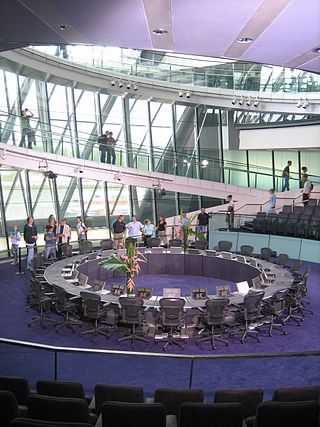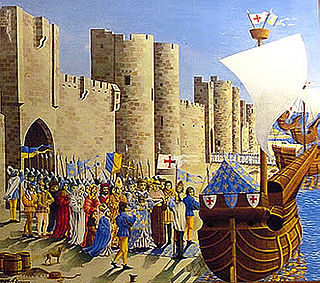
The World Council of Churches (WCC) is a worldwide Christian inter-church organization founded in 1948 to work for the cause of ecumenism. Its full members today include the Assyrian Church of the East, the Oriental Orthodox Churches, most jurisdictions of the Eastern Orthodox Church, the Old Catholic Church, the Lutheran churches, the Anglican Communion, the Mennonite churches, the Methodist churches, the Moravian Church, Mar Thoma Syrian Church and the Reformed churches, as well as the Baptist World Alliance and Pentecostal churches. Notably, the Catholic Church is not a full member, although it sends delegates to meetings who have observer status.

Ecumenism – also called interdenominationalism, transdenominationalism, or ecumenicalism – is the concept and principle that Christians who belong to different Christian denominations should work together to develop closer relationships among their churches and promote Christian unity. The adjective ecumenical is thus applied to any interdenominational initiative that encourages greater cooperation and union among Christian denominations and churches.

A council is a group of people who come together to consult, deliberate, or make decisions. A council may function as a legislature, especially at a town, city or county/shire level, but most legislative bodies at the state/provincial or national level are not considered councils. At such levels, there may be no separate executive branch, and the council may effectively represent the entire government. A board of directors might also be denoted as a council. A committee might also be denoted as a council, though a committee is generally a subordinate body composed of members of a larger body, while a council may not be. Because many schools have a student council, the council is the form of governance with which many people are likely to have their first experience as electors or participants.

The Uniting Church in Australia (UCA) was founded on 22 June 1977, when most congregations of the Methodist Church of Australasia, about two-thirds of the Presbyterian Church of Australia and almost all the churches of the Congregational Union of Australia united under the Basis of Union. According to the church, it had 243,000 members in 2018. In the 2016 census, about 870,200 Australians identified with the church; in the 2011 census, the figure was 1,065,796. The UCA is Australia's third-largest Christian denomination, behind the Catholic and the Anglican Churches. There are around 2,000 UCA congregations, and 2001 National Church Life Survey (NCLS) research indicated that average weekly attendance was about 10 per cent of census figures.
The Continuing Anglican movement, also known as the Anglican Continuum, encompasses a number of Christian churches, principally based in North America, that have an Anglican identity and tradition but are not part of the Anglican Communion.
The National Council of the Churches of Christ in the USA, usually identified as the National Council of Churches (NCC), is the largest ecumenical body in the United States. NCC is an ecumenical partnership of 38 Christian faith groups in the United States. Its member communions include mainline Protestant, Eastern Orthodox, African-American, evangelical, and historic peace churches. Together, it encompasses more than 100,000 local congregations and 40 million adherents. It began as the Federal Council of Churches in 1908, and expanded through merger with several other ecumenical organizations to become the National Council of Churches in 1950. Its Interim President and General Secretary is Bishop Vashti Murphy McKenzie.
The World Student Christian Federation (WSCF) is a federation of autonomous national Student Christian Movements (SCM) forming the youth and student arm of the global ecumenical movement. The Federation includes Orthodox, Protestant and Catholic students.
Progressive Christianity represents a postmodern theological approach, and is not necessarily synonymous with progressive politics. It developed out of the liberal Christianity of the modern era, which was rooted in the Enlightenment's thinking. Progressive Christianity is a postliberal theological movement within Christianity that, in the words of Reverend Roger Wolsey, "seeks to reform the faith via the insights of post-modernism and a reclaiming of the truth beyond the verifiable historicity and factuality of the passages in the Bible by affirming the truths within the stories that may not have actually happened."

The Christian Flag is an ecumenical flag designed in the early 20th century to represent much of Christianity and Christendom. Since its adoption by the United States Federal Council of Churches in 1942, it has been used by congregations of many Christian traditions, including Anglican, Baptist, Congregationalist, Lutheran, Mennonite, Methodist, Moravian, Presbyterian, and Reformed, among others.

The Canadian Council of Churches is a broad and inclusive ecumenical body, now representing 26 member churches including Anglican; Eastern and Roman Catholic; Evangelical; Free Church; Eastern and Oriental Orthodox; and Historic Protestant traditions. Together these member churches represent 13,500 worshiping communities and comprise 85% of the Christians in Canada.
The Australian Student Christian Movement (ASCM), formerly the Australasian Student Christian Union, is a Christian group with an ecumenical focus working with university students.
The Australian Christian Churches (ACC), formerly Assemblies of God in Australia, is a network of Pentecostal churches in Australia affiliated with the World Assemblies of God Fellowship, which is the largest Pentecostal denomination in the world.
The Reverend Professor Ian James Mitchell Haire AC KStJ is a theologian and Christian minister of religion. He is emeritus professor of Charles Sturt University, Canberra, Australia and past executive director of the Australian Centre for Christianity and Culture. He was formerly the fourth president of the National Council of Churches in Australia and the ninth president of the Uniting Church in Australia.

In the history of Christianity, the first seven ecumenical councils include the following: the First Council of Nicaea in 325, the First Council of Constantinople in 381, the Council of Ephesus in 431, the Council of Chalcedon in 451, the Second Council of Constantinople in 553, the Third Council of Constantinople from 680–681 and finally, the Second Council of Nicaea in 787. All of the seven councils were convened in modern-day Turkey.

The National Council of Churches in the Philippines is a fellowship of ten Protestant and non Roman Catholic Churches in the Philippines denominations, and ten service-oriented organizations in the Philippines. A member of the World Council of Churches and the Christian Conference of Asia, the NCCP represents close to twelve million Protestant adherents. Advocacy for environmental protection and against large-scale mining are part of its core mission. Christian organizations other than churches may be received as associate members.
Dr. Kang Won Yong was a Christian leader, pioneer of the ecumenical movement in Korea, and an advocate for peace and reconciliation in the Korean peninsula.

Rev. Gregor Sutherland Henderson is an ordained Christian minister of the Uniting Church in Australia. For 12 years he was the General Secretary of the UCA's National Assembly and was the President of the National Assembly for three years 2006-2009.
The Ecumenical Accompaniment Programme in Palestine and Israel is an international, ecumenical programme that recruits and despatches observers to several Palestinian towns and villages to monitor the interaction between the Palestinian inhabitants and the Israeli military. The presence of EAs is intended to offer protection and to moderate friction. Abuses of authority are monitored and reported and EAs speak publicly of their experiences. The EAPPI was founded in 2002 under the auspices of the World Council of Churches, in response to requests from Heads of Churches in Jerusalem. Bishop Munib Younan of the Evangelical Lutheran Church in Jordan and the Holy Land is also one of the founders.

The history of Christian flags encompasses the establishment of Christian states, the Crusader era, and the 20th century ecumenical movement.









